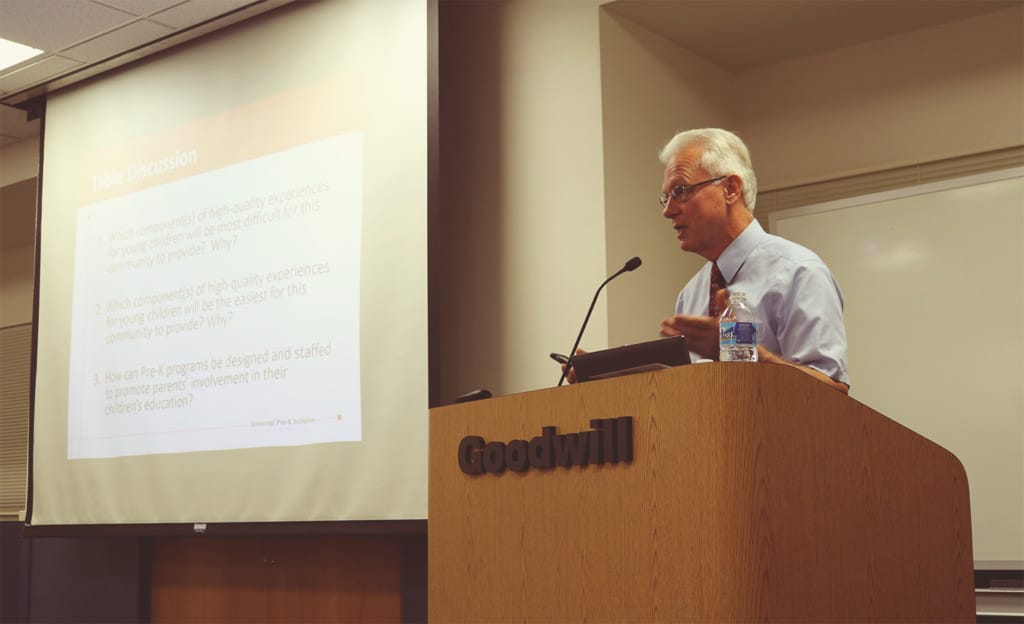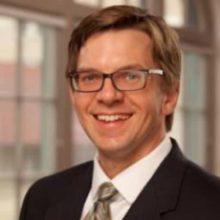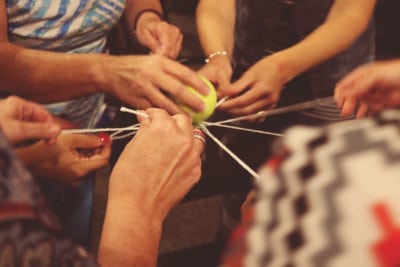

The goal – our community’s goal – is to establish a Pre-K system in Forsyth County that gives every child the opportunity to reach his or her full potential. Do we owe our children anything less? — Universal Pre-K Initiative for Forsyth County Position Paper.
Earlier this month, in the culmination of more than two years of planning and research, the Universal Pre-K Initiative unveiled a multi-year plan for implementing a system of universal Pre-K in Forsyth County.
“Forsyth County has a unique opportunity to move toward expanding and increasing our Pre-K system,” said Bob Feikema to the crowd of more than 60 community leaders who had gathered at the Winston-Salem offices of Goodwill.
Feikema, the president & CEO of Family Services and a member of the Universal Pre-K Initiative Steering Committee, lead the group through a series of presentations by fellow committee members and facilitated breakout discussion on each of the three main target areas identified by the group’s report: advocacy, funding, and quality standards.
And though there was a celebratory feel to the event, a recognition of the time and effort that went into the work to get the group to this point in time, there was also a sense of caution that the most difficult work was still ahead.
“There’s a long way to go,” Feikema said later in the event. “And each step we take we need to be mindful of what is involved in establishing an effective, high-quality Pre-K system.”
“This gives us a good foundation for moving forward,” Feikema continued. “But moving forward will require a community-wide planning process that includes all the parties committed to the creation of a quality universal Pre-K system. But how do we get there?”


In 2014, Feikema convened a group of childhood advocates and practitioners from across the county to explore ways to expand Pre-K services to the county’s three- and four-year-olds. From that group, the Universal Pre-K Steering Committee was formed, with a community forum following in 2015. Out of that forum came three early childhood working groups. For the second half of 2015, the working groups researched and formulated action items for three key focus areas: quality standards, local funding options, and community benefits.
The goal: Present to the community a road map for implementing a county-wide system of universal Pre-K, phased in over a multi-year period.
The Initiative’s research lead them to the conclusion that a universal system was most attainable when it focused on the county’s population of three- and four-year-olds first. The reasons, as identified in the group’s report, are:
–Many members of the working group already were accountable for operating or funding the operations of high-quality early childhood settings serving three- and four-year-olds with public funds;
–Settings for three- and four-year-olds, though expensive, carry less cost than for serving infants and toddlers;
–Most families recognize the benefits of having their children enrolled in child development programs as their children approach kindergarten;
–Greater state and federal investment is available for serving three-and four-year-olds than for younger children;
–Because of the North Carolina Pre-K Program (NC Pre-K), there is already more coordination of services and higher standards of care for children in four-year-old classrooms;
–Expanding the availability of four-year-old classrooms mirrors the roll-out of kindergarten (the five-year-old classroom) in the last quarter of the 20th century;
–Many other communities around the United States – both smaller and larger than Winston-Salem/Forsyth County – have been successful in expanding early learning programs
“Early intervention is akin to preventative medicine, helping children develop faculties and skills during a vital period in their development when they are most cognitively adaptive and rapidly developing new neural pathways.”– Universal Pre-K Initiative for Forsyth County.
Advocacy: Making the case
“I am so excited about what we are doing around expanding opportunities for families who want to get their kids into high-quality, first-class, safe, engaging, and equitable early-childhood settings,”said Larry Vellani, executive director of Smart Start of Forsyth County and a member of the Universal Pre-K Initiative Steering Committee.
Vellani presented to the gathering on messaging and how to advocate in the community for universal Pre-K.
“Universal Pre-K benefits the entire community,” Vellani said. “We think that is an anchor message.”
Vellani encouraged the group to reach out to all households in the community, to all families, and to residents from all walks of life. Vellani said that included not just the families, but business leaders, faith communities, and the general public who may not have young children or grandchildren.
“Everyone has a stake in this thing.”
Vellani reminded those in attendance that the earliest months and years in life were critical for developing a child’s full potential. He said that long before a child steps foot in a kindergarten classroom, children are developing the skills they will need to be successful later in life. Skills built upon a rapidly developing neural network.
Snapping his fingers, Vellani asked the crowd how many neural pathways would be formed in a child’s brain in the amount of time it took him to perform the gesture. The answer: 700.
“In the first two thousand days, in the snap of a finger, 700 neural nets are being developed, are coming online in a child’s mind,” Vellani said. “Those nets are looking for a way to get connected.”
He told the group that by reaching children during those most developmentally sensitive periods with quality Pre-K services, the community would see a lifetime of returns that included improved academic performance, greater lifetime earnings, improved health outcomes, and reduced incarceration, just to name a few.
Vellani said that access to quality Pre-K had been shown to reduce the academic achievement gap for minority and low-income students, specifically in third-grade math and reading scores.
See the full report and the presentation below for a complete set of recommended talking points.
“Meaningful family engagement in children’s early learning supports school readiness and later academic success.”– Universal Pre-K Initiative for Forsyth County.
Quality: Maintaining and improving high standards
Eva Phillips, Ready Schools coordinator for the Winston-Salem/Forsyth County Schools and a member of the Universal Pre-K Initiative Steering Committee, presented on ways to maintain the standard of quality already present in the county’s current Pre-K options while expanding services to more children.
“We know that children’s experiences before they come to school are critical to their success,” Phillips said. “Research shows that high-quality care and education will help children be more prepared, and will help us, as educators, be more prepared for the children who are coming into our classrooms.”
Phillips outlined action steps focused on the Pre-K curriculum, as well as student screening and assessment–the initial and ongoing monitoring that alerts educators to student’s strengths and needs.
Family engagement strategies were identified by Phillips as key to the success of any Pre-K program. The Initiative’s report calls for the implementation of the evidence-based Family Engagement Curriculum and the assignment of a family advocate/educator to all Pre-K classrooms in the county.
One of the action items Phillips mentioned, which drew a strong reaction of support from the crowd, was the ongoing professionalization of the early-childhood education field through increased compensation and benefits.
“We know that these teachers are not paid what they deserve,” Phillips said. “How do we attract teachers to this field? We know how critical it is, but if we don’t have folks who see this as a career option where they can see themselves doing an important job and making a living at the same time, we aren’t going to get the folks that we need in these classrooms.”
Phillips concluded by reminding those in attendance that quality work was already being done in the community.
“We need to build on what already exists,” Phillips told the group. “We have some excellent programs in Forsyth County.”
See the full report and the presentation below for a complete set of recommendations for improving Pre-K standards and quality throughout the county.
“By improving early education we strengthen opportunities not only for employers and the current work force, but for the employers and workforce of the future, as high-quality, affordable child care is a primary building block for the fitness of every generation of families, employers, and employees.” — Universal Pre-K Initiative for Forsyth County.
Funding: Paying for universal Pre-K
Imprint Cares Executive Director and Universal Pre-K Initiative Steering Committee member Nikki Byers detailed possible funding models for a universal Pre-K system, walking the group through a scenario of public and private models that would support an expanded, high-quality system in the county.
The first issue the funding working group had to face was just how many children would be served by a universal county-wide system of early childhood education. Using population estimates and live birth data from the North Carolina Office of State Budget and Management, along with past trends in Kindergarten enrollment in the Winston-Salem/Forsyth County Public Schools, the group identified a theoretical cohort of roughly 4,500 Pre-K students.
“We know that if we were to start universal Pre-K–based on other sites that have started universal Pre-K–the uptake rate would look like this,” Byers said, pointing to one of her slide projections. “The first year about 65 percent of children would enroll; in the second year 80 percent would enroll; and by the third year, 90 percent would enroll.”
“And that is what we would base it on: 90 percent enrollment,” Byers said. “That means we would need to prepare for 4,050 children.”
However, she reminded the group that some of those children are already being served under the county’s current system of Pre-K options.
“Out of that 4,050 cohort, we are now serving 1,184,” Byers reminded the group. The reality then would mean that funding and classrooms would need to be found for an additional 2,866 children.
And the cost to fund universal Pre-K for 90 percent of all eligible children in the county? It is estimated at more than $24 million annually, or roughly $8,400 per student, for the additional 2,866 children that would enter the system. That amount is a bare minimum that does not include increased teacher compensation or enhanced services, such as staffing family advocates in the classrooms.
That figure is in addition to the funding that is currently in place for the 1,184 children already being served in the county. That is funding the group does not want to supersede with new funding. “We want to build on what we have, we do not want to supplant,” Byers said.
Byers then listed options to generate new funding for expanded Pre-K. Those options include a local sales tax, increased property taxes, family tax credits, parent fees, and social-impact bond financing.
Social-impact bond financing has been gaining attention in recent years as a new option to pay for social services that pegs outcomes to payment. It has been used in other states to address prisoner recidivism rates and reduce government cost for re-incarcerated prisoners.
“It is the whole concept of a return on investment,” Byers told the group.
In short, a social-impact bond model means a government or municipal entity partners with an outside agency to reduce additional services for children, services that might be costly and possibly redundant. The agency would partner with an outside investor for the upfront capital to implement their program. A third-party auditor would analyze programmatic results after a period of time and determine if the agreed upon outcomes had been met. If so, the agency and investor would be paid a portion of the savings from those services that were not rendered.
Regardless of what ratio of revenue sources complete the funding model for the county’s universal Pre-K, the real challenge will be managing a comprehensive system that is dependent upon may different funding sources, each with their own restrictions and eligibility requirements.
“We have amazing complexity when we look at how our current systems work,” Byers told the group. “How do we simplify it?”
At one point in her presentation, Byers took a moment to remind the group that regardless of the challenges of securing additional funding and the complexity of managing multiple funding streams, the end result was a beneficial system with an extremely high rate of return on investment.
One more conservative measure placed the return at $7 for every $1 spent.
“There are even bigger returns on investment,” Byers said. “Like the really famous Perry Preschool Program that has been following the children for years.” That study has followed preschool participants well into their 40’s and found a return on investment of close to $16 for every $1.7 spent.
See the full report and the presentation below for a more detailed analysis of funding models for a universal Pre-K system.
Feikema concluded the event by reminding the group of the challenges they faced to fully implement a system of universal Pre-K in the county.
“[The report] summarizes the best knowledge of about 25 people who contributed to this work, but there is no question it can be enhanced and it needs to be deepened,” Feikema said. “In some ways, we’ve only scratched the surface.”
“There is a lot of detailed, complex work to be done,” Feikema said later. “We will need everyone’s help to take us to the next level. But I have no doubt that we will succeed in bringing universal Pre-K to Forsyth County.”
Universal Pre-K Initiative Position Paper
Universal Pre-K Initiative Forum Presentation
Editor’s note: Do you think a universal system of Pre-K would work in your county? What would be the challenges? Are their pieces already in place for a universal system to work? Tell us more in the comments section below or on social media.


